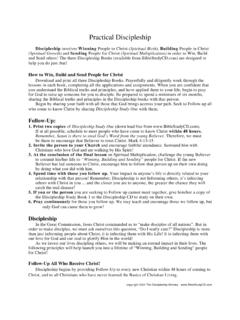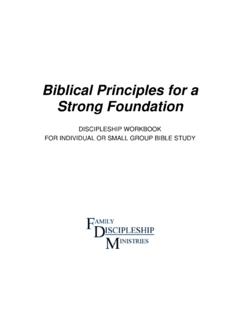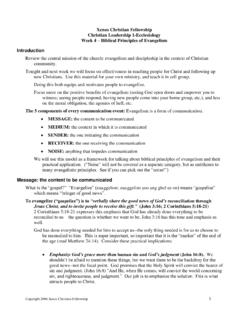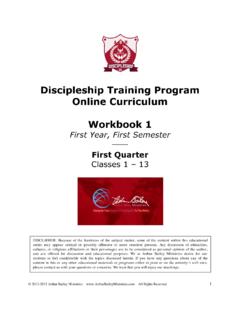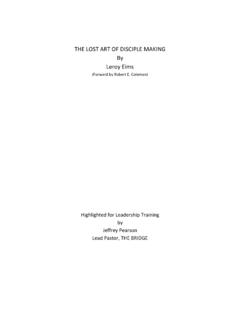Transcription of Lesson 2: Principles of Evangelism - …
1 Module 3 / Lesson 2: Principles of Evangelism Michael D rnbrack Page 1 Lesson 2: Principles of Evangelism Introduction In our last Lesson , we discovered that our identity determines, more than anything else, the success of our mission work. Who we are is so much more important than what we do. Our identity is made up of the commission that God gave to the church, the vision of the church that derives from that commission, and the biblical values of the church that reflect that character of the church. Please write in the temple below the vision and the values that we discovered in the last Lesson ! Please write down in your own words what significance this identity has for our mission. Module 3 / Lesson 2: Principles of Evangelism Michael D rnbrack Page 2 God s commission to the church, the vision of the church, and its values are inseparable.
2 The church s vision is derived from its commission and the commission cannot be fulfilled unless the members, as a group and as individuals, live out biblical values. When biblical vision and values are clear, we are better able to determine how we can reach people for Jesus. Sometimes we attempt to make plans for strategies, concepts, and methods without having laid this important foundation. The fact is that if we do not know our own identity, our strategies, concepts, and methods will not bear fruit. In short, our outreach practices must grow out of God s commission and biblical values. How can we reach people with the gospel in this day and age? Jesus himself is our best example. In His efforts to reach people with the love of God He worked with a concept. Ellen White explains it this way: Quote #1 The great Teacher laid plans for His work.
3 Study these plans. ( Evangelism , p. 53) Jesus efforts to reach out to people with the message of salvation were not purposeless, haphazard actions. When we study the methods Jesus used we see that He followed definite Principles in His work. Let s discover these Principles ! Our vision for the church God s values for the church I D E N T I T Y Strategy / Concept / Methods God s commission to the church Module 3 / Lesson 2: Principles of Evangelism Michael D rnbrack Page 3 Which Principles come to your mind when you consider how Jesus reached out to the people? Principles and Methods Different cultures and situations require different methods. However, the Principles behind those methods remain the same for every culture we might find ourselves in because the human heart is the same everywhere. Everyone wants to be loved, accepted, and esteemed.
4 The problem, sin and all of its consequences, is the same everywhere. Likewise, God s solution is the same irrespective of all cultural differences, namely salvation through Jesus Christ. When we look at how Jesus himself reached people with the gospel, we discover that the Principles he followed are universally valid. In the lessons of module 3 we will uncover these Principles step by step. Mission and agriculture We can discover one important principle by simply looking at how Jesus taught. For example, he repeatedly associated mission to agriculture. Many of His parables paint a picture of the seed (God s word) being sown in the hearts of the people. As Jesus spoke with the woman at Jacobs well and led her to believe, she ran into the city and told everyone about Jesus. The disciples came back and were surprised that Jesus had even spoken to a Samaritan woman.
5 Where Jesus saw a large harvest they saw only a desert. What was Jesus answer to them? John 4:35-38: Paul knew this comparison and used it himself to describe his own mission work. Read the following text. 1. Corinthians 3:6-9: Module 3 / Lesson 2: Principles of Evangelism Michael D rnbrack Page 4 The Cycle of Evangelism The people understood the association with agriculture well. They knew that a farmer first prepared the ground, planted the seed, and then cared for the plant. These were all necessary steps before a harvest could be expected. After the harvest, the farmer always kept some of the seed to plant the next season. These four stages also apply to our mission. Please fill in the four stages of Evangelism (planting, cultivating, harvesting, preserving) in the diagram below.
6 Begin with the top right side: We can learn a lot from the Bible s analogy of agriculture and mission work. These teachings are fundamental and indispensable to successful mission work. Let s take a closer look at these Principles . Lesson #1 God has established firm laws for the work of Evangelism . There are natural laws which God has placed in nature, when understood and followed they provide the farmer with a rich harvest. If he does not follow them then his harvest will be disappointing. When it comes to winning souls for Jesus, there are also laws and Principles , which when they are observed and followed bring people to the point that they must decide whether or not they will follow Jesus. Lesson #2 Evangelism is not an event; it is a constant process. Many church members see evangelisation as an outreach event or a series of meetings.
7 But just like the farmer constantly working through the cycle of planting, cultivating, harvesting, and preserving, true mission work is a continual process. It is a lifestyle, for both the church as a group and its individual members. Lesson #3 Those who want to harvest must sow and cultivate. A farmer would never leave his fields to themselves and expect to have a rich harvest. But, some churches do exactly that. They hold large evangelistic meetings without having built personal relationships with the people, preparing them for God s word. They depend on large advertising campaigns to bring the people to the meeting and then when no one comes they complain in frustration that public Evangelism does not work today. In reality they have disregarded the Principles of sowing and harvesting and are trying to harvest where they have not sown.
8 If we want to see people become followers of Jesus, we must first sow the word of Personal Preparation Module 3 / Lesson 2: Principles of Evangelism Michael D rnbrack Page 5 God. Then we have to cultivate our relationship with them and support them in their spiritual growth. The main focus must be on preparing people. Lesson #4 We can expect a rich harvest after we have sown and cultivated. A farmer that sows the seed wants to experience a harvest. But many think today, All we have to do is to sow the seed and God will take care of the harvest. In heaven we will see what our work has brought forth. Of course God takes care of the harvest. The conversion of a soul is always the work of the Holy Spirit. However, the Holy Spirit wants to use us to bring in the harvest. It is true that we will experience some surprises when we get to heaven and God shows us the outworking of our simple and weak attempts at soul winning.
9 But God wants us to see the results of our work now people who have given their hearts to Him. He doesn t want us to have to wait until heaven to see if our work has brought forth any fruit. Jesus says: You did not choose Me, but I chose you and appointed you that you should go and bear fruit, and that your fruit should remain, that whatever you ask the Father in My name He may give you. (John 15:16) When we follow God s Principles we can expect that people will make the decision to follow Christ. Lesson #5 Preserving the harvest is important to staying alive In Bible times a farmer had to keep a portion of the harvest as seed for the next season. If we make an analogy with Evangelism , we see that our job is not just to bring people into the church but to make sure that they stay in the church by helping them to grow in faith and by cultivating relationships with them that encourage them to go out and tell others about Jesus.
10 The lessons about discipleship groups cover this important topic in detail. Lesson #6 Your own personal preparation is central to every success in Evangelism . A farmer has to prepare well for his work if he is going to be successful. In Evangelism , personal preparation is indispensable. In the end, we can only lead people to Jesus if we ourselves are enthusiastic about Him. The best methods cannot work when we ourselves are not filled with the Holy Spirit. We covered this foundation in modules 1 and 2 in great detail. Lesson #7 We have to understand where people are in their spiritual lives. A farmer has different methods of sowing, cultivating, harvesting, and preserving. A young plant that has just sprung up out of the soil needs a different kind of handling than one that is just about to be harvested. It is the same with people.
